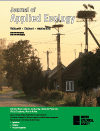 The University of Cologne has conducted an investigation into the research of Tina Wenz, and determined that six papers should be pulled due to scientific misconduct.
The University of Cologne has conducted an investigation into the research of Tina Wenz, and determined that six papers should be pulled due to scientific misconduct.
In a release issued last week (as first reported by Leonid Schneider), the university lists six papers that “present scientific misconduct,” according to our Google Translate.
One of the six papers was already retracted last year by Cell Metabolism, which cited reused northern and western blot band images in two figures.
The other six papers are: Continue reading German university recommends that six papers be retracted following probe
 A U.S. Congressional subcommittee is investigating two cases of fraud affecting one Colorado lab run by the U.S. Geological Survey (USGS).
A U.S. Congressional subcommittee is investigating two cases of fraud affecting one Colorado lab run by the U.S. Geological Survey (USGS).






